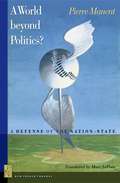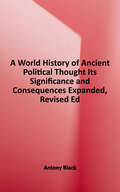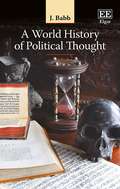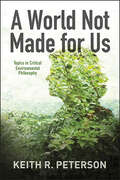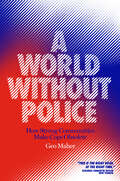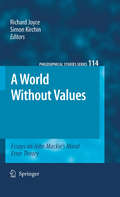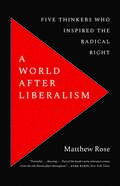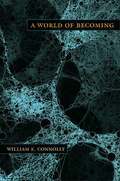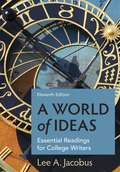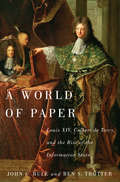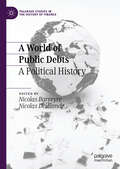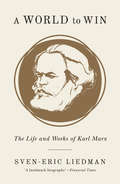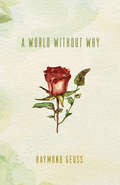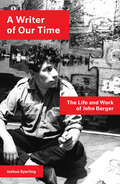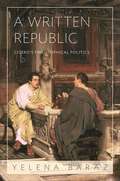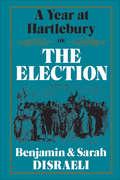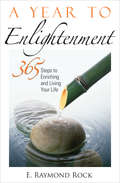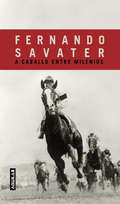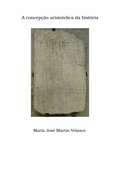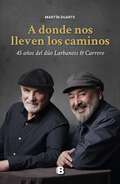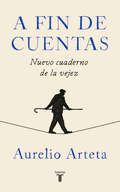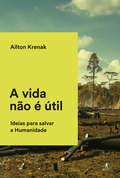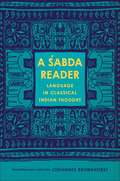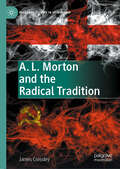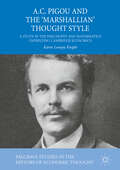- Table View
- List View
A World Beyond Politics?: A Defense Of The Nation-state
by Pierre Manent Marc A. LePainWe live in the grip of a great illusion about politics, Pierre Manent argues in A World beyond Politics? It's the illusion that we would be better off without politics--at least national politics, and perhaps all politics. It is a fantasy that if democratic values could somehow detach themselves from their traditional national context, we could enter a world of pure democracy, where human society would be ruled solely according to law and morality. Borders would dissolve in unconditional internationalism and nations would collapse into supranational organizations such as the European Union. Free of the limits and sins of politics, we could finally attain the true life.
A World History of Ancient Political Thought: Its Significance and Consequences
by Antony BlackThis book examines the political thought of China, Greece, Israel, Rome, India, Iran, Egypt, Mesopotamia, and also early Christianity, from prehistory to c. 200 CE. Each of these had its priorities, based on a religious and philosophical perspective. This led to different ideas about who should govern, how to govern, and what government was for. In most cultures, sacred monarchy was the norm, but this ranged from absolute to conditional authority. 'The people' were recipients of royal (and divine) beneficence. Justice, the rule of law, and meritocracy were generally regarded as fundamental. In Greece and Rome, democracy and liberty were born, while in Israel the polity was based on covenant and the law. Confucius taught humaneness, Mozi and Christianity taught universal love; Kautilya and the Chinese 'Legalists' believed in realpolitik and an authoritarian state. <p><p>The conflict between might and right was resolved in many different ways. Chinese, Greek and Indian thinkers reflected on the origin and purposes of the state. Status and class were embedded in Indian and Chinese thought, the nation in Israelite thought. On the other hand, the Stoics and Cicero saw humanity as a single unit. Political philosophy, using logic, evidence and dialectic, was invented in China and Greece, statecraft in China and India, political science in Greece. Plato and Aristotle, followed by Polybius and Cicero, started 'western' political philosophy. This book covers political philosophy, religious ideology, constitutional theory, social ethics, official and popular political culture.
A World History of Political Thought
by J. BabbIts an outstanding and innovative work with profound significance for the study of the history of political thought, providing a wide-ranging, detailed and global overview of political thought from 600 BC to the 21st century. Treating both western and non-western systems of political thought as equal and placing them as they should be; side by side.
A World Not Made for Us: Topics in Critical Environmental Philosophy (SUNY series in Environmental Philosophy and Ethics)
by Keith R. PetersonIn A World Not Made for Us, Keith R. Peterson provides a broad reassessment of the field of environmental philosophy, taking a fresh and critical look at three classical problems of environmentalism: the intrinsic value of nature, the need for an ecological worldview, and a new conception of the place of humankind in nature. He makes the case that a genuinely critical environmental philosophy must adopt an ecological materialist conception of the human, a pluralistic value theory that emphasizes the need for value prioritization, and a stratified categorial ontology that affirms the basic principle of human asymmetrical dependence on more-than-human nature. Integrating environmental ethics with the latest work in political ecology, Peterson argues it is important to understand that the world is not made for us, and that coming to terms with this fact is a condition for survival in future human and more-than-human communities of liberation and solidarity.
A World Without Police: How Strong Communities Make Cops Obsolete
by Geo MaherIf police are the problem, what’s the solution? <p><p> Tens of millions of people poured onto the streets for Black Lives Matter, bringing with them a wholly new idea of public safety, common security, and the delivery of justice, communicating that vision in the fiery vernacular of riot, rebellion, and protest. A World Without Police transcribes these new ideas—written in slogans and chants, over occupied bridges and hastily assembled barricades—into a compelling, must-read manifesto for police abolition. <p><p> Compellingly argued and lyrically charged, A World Without Police offers concrete strategies for confronting and breaking police power, as a first step toward building community alternatives that make the police obsolete. Surveying the post-protest landscape in Minneapolis, Philadelphia, Chicago, and Oakland, as well as the people who have experimented with policing alternatives at a mass scale in Latin America, Maher details the institutions we can count on to deliver security without the disorganizing interventions of cops: neighborhood response networks, community-based restorative justice practices, democratically organized self-defense projects, and well-resourced social services. <p><p> A World Without Police argues that abolition is not a distant dream or an unreachable horizon but an attainable reality. In communities around the world, we are beginning to glimpse a real, lasting justice in which we keep us safe.
A World Without Values: Essays on John Mackie's Moral Error Theory (Philosophical Studies Series #114)
by Richard Joyce Simon KirchinWhat kind of properties are moral qualities, such as rightness, badness, etc? Some ethicists doubt that there are any such properties; they maintain that thinking that something is morally wrong (for example) is comparable to thinking that something is a unicorn or a ghost. These "moral error theorists" argue that the world simply does not contain the kind of properties or objects necessary to render our moral judgments true. This radical form of moral skepticism was championed by the philosopher John Mackie (1917-1981). This anthology is a collection of philosophical essays critically examining Mackie's view.
A World after Liberalism: Philosophers of the Radical Right
by Matthew RoseA bracing account of liberalism&’s most radical critics, introducing one of the most controversial movements of the twentieth century In this eye-opening book, Matthew Rose introduces us to one of the most controversial intellectual movements of the twentieth century, the &“radical right,&” and discusses its adherents&’ different attempts to imagine political societies after the death or decline of liberalism. Questioning democracy&’s most basic norms and practices, these critics rejected ideas about human equality, minority rights, religious toleration, and cultural pluralism not out of implicit biases, but out of explicit principle. They disagree profoundly on race, religion, economics, and political strategy, but they all agree that a postliberal political life will soon be possible. Focusing on the work of Oswald Spengler, Julius Evola, Francis Parker Yockey, Alain de Benoist, and Samuel Francis, Rose shows how such thinkers are animated by religious aspirations and anxieties that are ultimately in tension with Christian teachings and the secular values those teachings birthed in modernity.
A World of Becoming
by William E. ConnollyIn A World of Becoming William E. Connolly outlines a political philosophy suited to a world whose powers of creative evolution include and exceed the human estate. This is a world composed of multiple interacting systems, including those of climate change, biological evolution, economic practices, and geological formations. Such open systems, set on different temporal registers of stability and instability, periodically resonate together to produce profound, unpredictable changes. To engage such a world reflectively is to feel pressure to alter established practices of politics, ethics, and spirituality. In pursuing such a course, Connolly draws inspiration from philosophers such as Maurice Merleau-Ponty, Alfred North Whitehead, and Gilles Deleuze, as well as the complexity theorist of biology Stuart Kauffman and the theologian Catherine Keller. Attunement to a world of becoming, Connolly argues, may help us address dangerous resonances between global finance capital, cross-regional religious resentments, neoconservative ideology, and the 24-hour mass media. Coming to terms with subliminal changes in the contemporary experience of time that challenge traditional images can help us grasp how these movements have arisen and perhaps even inspire creative counter-movements. The book closes with the chapter "The Theorist and the Seer," in which Connolly draws insights from early Greek ideas of the Seer and a Jerry Lewis film, The Nutty Professor, to inform the theory enterprise today.
A World of Ideas: Essential Readings for College Writers
by Lee A. JacobusThe book engages students with the big ideas that have shaped society and are reshaping it today. Readings by essential authors -help students trace the origins of central cultural concepts and respond to them. A World of Ideas asks such crucial questions as, What defines good government? What forces shape our society? What does it mean to be educated? The text helps students respond to these questions by providing the guidance they need to understand, analyze, and write. Substantial, supportive apparatus helps students focus on both the content of the readings as well as the rhetorical moves that writers use to achieve their purposes, providing instruction and models as students join in the important conversations continuing today. New chapters on Education and Gender, and new readings throughout, speak to today's urgent concerns. Improved writing instruction includes more scaffolding and examples that provide greater support for students.
A World of Paper: Louis XIV, Colbert de Torcy, and the Rise of the Information State
by John C. Rule Ben S. TrotterHistorians and social scientists have long identified bureaucracy as the modern state's foundation and the reign of France's Louis XIV as a model for its development. A World of Paper offers a fresh interpretation of bureaucracy through a close examination of the department of the Sun King's last foreign secretary, Jean-Baptiste Colbert de Torcy. Torcy, who served as foreign secretary from 1696-1715, is widely regarded as one of the most brilliant foreign ministers of the ancien regime. Building on the work of his predecessors, he fashioned a skilled team of collaborators as he managed the complex issues of war and peace during the turbulent final decades of Louis XIV's reign. John Rule and Ben Trotter examine Torcy's department to depict administrative structures as they emerged through the circulating stream of paper that connected his office with provincial administrators and diplomats abroad. They explore the collection and centralization of information during Torcy's tenure through the creation of a modern state archive, discreet intelligence gathering, and the surveillance and management of the French mails. They also study the postal carriers, couriers, household officers of the royal court, genealogists hired for research, and an informal "brain trust" of experts, and advisors who carried vital information in and out of the department every day. A remarkable reconstruction of the department of Jean-Baptiste Colbert de Torcy, A World of Paper demystifies bureaucracy and explores the ways in which the modern information state developed from his labours.
A World of Public Debts: A Political History (Palgrave Studies in the History of Finance)
by Nicolas Barreyre Nicolas DelalandeThis book analyzes public debt from a political, historical, and global perspective. It demonstrates that public debt has been a defining feature in the construction of modern states, a main driver in the history of capitalism, and a potent geopolitical force. From revolutionary crisis to empire and the rise and fall of a post-war world order, the problem of debt has never been the sole purview of closed economic circles. This book offers a key to understanding the centrality of public debt today by revealing that political problems of public debt have and will continue to need a political response. Today’s tendency to consider public debt as a source of fragility or economic inefficiency misses the fact that, since the eighteenth century, public debts and capital markets have on many occasions been used by states to enforce their sovereignty and build their institutions, especially in times of war. It is nonetheless striking to observe that certain solutions that were used in the past to smooth out public debt crises (inflation, default, cancellation, or capital controls) were left out of the political framing of the recent crisis, therefore revealing how the balance of power between bondholders, taxpayers, pensioners, and wage-earners has evolved over the past 40 years. Today, as the Covid-19 pandemic opens up a dramatic new crisis, reconnecting the history of capitalism and that of democracy seems one of the most urgent intellectual and political tasks of our time. This global political history of public debt is a contribution to this debate and will be of interest to financial, economic, and political historians and researchers. Chapters 13 and 19 are available open access under a Creative Commons Attribution 4.0 International License via link.springer.com.
A World to Win: The Life and Thought of Karl Marx
by Sven-Eric Liedman Jeffrey N. SkinnerEpic new biography of Karl Marx for the 200th anniversary of his birthIn this essential new biography—the first to give equal weight to both the work and life of Karl Marx—Sven-Eric Liedman expertly navigates the imposing, complex personality of his subject through the turbulent passages of global history. A World to Win follows Marx through childhood and student days, a difficult and sometimes tragic family life, his far-sighted journalism, and his enduring friendship and intellectual partnership with Friedrich Engels.Building on the work of previous biographers, Liedman employs a commanding knowledge of the nineteenth century to create a definitive portrait of Marx and his vast contribution to the way the world understands itself. He shines a light on Marx’s influences, explains his political and intellectual interventions, and builds on the legacy of his thought. Liedman shows how Marx’s masterpiece, Capital, illuminates the essential logic of a system that drives dizzying wealth, grinding poverty, and awesome technological innovation to this day.Compulsively readable and meticulously researched, A World to Win demonstrates that, two centuries after Marx’s birth, his work remains the bedrock for any true understanding of our political and economic condition.
A World without Why
by Raymond GeussWhy the human and natural world is not as intelligible to us as we think it isWishful thinking is a deeply ingrained human trait that has had a long-term distorting effect on ethical thinking. Many influential ethical views depend on the optimistic assumption that, despite appearances to the contrary, the human and natural world in which we live could, eventually, be made to make sense to us. In A World without Why, Raymond Geuss challenges this assumption.The essays in this collection—several of which are published here for the first time—explore the genesis and historical development of this optimistic configuration in ethical thought and the ways in which it has shown itself to be unfounded and misguided. Discussions of Greco-Roman antiquity and of the philosophies of Socrates, Plato, Hegel, Marx, Nietzsche, and Adorno play a central role in many of these essays. Geuss also ranges over such topics as the concepts of intelligibility, authority, democracy, and criticism; the role of lying in politics; architecture; the place of theology in ethics; tragedy and comedy; and the struggle between realism and our search for meaning.Characterized by Geuss's wide-ranging interests in literature, philosophy, and history, and by his political commitment and trenchant style, A World without Why raises fundamental questions about the viability not just of specific ethical concepts and theses, but of our most basic assumptions about what ethics could and must be.
A Writer of Our Time: The Life and Work of John Berger
by Joshua SperlingThe first intellectual biography of the life and work of John BergerJohn Berger was one of the most influential thinkers and writers of postwar Europe. As a novelist, he won the Booker prize in 1972, donating half his prize money to the Black Panthers. As a TV presenter, he changed the way we looked at art with Ways of Seeing. As a storyteller and political activist, he defended the rights and dignity of workers, migrants, and the oppressed around the world. “Far from dragging politics into art,” he wrote in 1953, “art has dragged me into politics.” He remained a revolutionary up to his death in January 2017.Built around a series of watersheds, at once personal and historical, A Writer of Our Time traces Berger’s development from his roots as a postwar art student and polemicist in the Cold War battles of 1950s London, through the heady days of the 1960s—when the revolutions were not only political but sexual and artistic—to Berger’s reinvention as a rural storyteller and the long hangover that followed the rise and fall of the New Left.Drawing on first-hand, unpublished interviews and archival sources only recently made available, Joshua Sperling digs beneath the moments of controversy to reveal a figure of remarkable complexity and resilience. The portrait that emerges is of a cultural innovator as celebrated as he was often misunderstood, and a writer increasingly driven as much by what he loved as by what he opposed. A Writer of Our Time brings the many faces of John Berger together, repatriating one of our great minds to the intellectual dramas of his and our time.
A Written Republic: Cicero's Philosophical Politics
by Yelena BarazIn the 40s BCE, during his forced retirement from politics under Caesar's dictatorship, Cicero turned to philosophy, producing a massive and important body of work. As he was acutely aware, this was an unusual undertaking for a Roman statesman because Romans were often hostile to philosophy, perceiving it as foreign and incompatible with fulfilling one's duty as a citizen. How, then, are we to understand Cicero's decision to pursue philosophy in the context of the political, intellectual, and cultural life of the late Roman republic? In A Written Republic, Yelena Baraz takes up this question and makes the case that philosophy for Cicero was not a retreat from politics but a continuation of politics by other means, an alternative way of living a political life and serving the state under newly restricted conditions. Baraz examines the rhetorical battle that Cicero stages in his philosophical prefaces--a battle between the forces that would oppose or support his project. He presents his philosophy as intimately connected to the new political circumstances and his exclusion from politics. His goal--to benefit the state by providing new moral resources for the Roman elite--was traditional, even if his method of translating Greek philosophical knowledge into Latin and combining Greek sources with Roman heritage was unorthodox. A Written Republic provides a new perspective on Cicero's conception of his philosophical project while also adding to the broader picture of late-Roman political, intellectual, and cultural life.
A Year at Hartlebury, Or, The Election
by Benjamin Disraeli Sarah DisraeliThe revelation that a long forgotten novel first published anonymously in 1834 is the work of Benjamin Disraeli and his sister Sarah is an exciting literary event. Newly discovered letters between brother and sister prove without doubt that it was written jointly by them. We do not have to look far for the reason for their secrecy. The vividly described election which forms the centrepiece of the story is clearly based on Disraeli's recent experiences as an unsuccessful candidate in two elections at High Wycombe. His political career had a long way to go and the last thing he wanted was to jeopardize it by revealing his motives in the past or his hopes for the future. The hero, Aubrey Bohun, has, like Disraeli, recently returned from mysterious travels in the East, but unlike him has his own castle and an income of £30,000 a year. Bohun obviously contains an element of wish fulfilment and allows the authors to incorporate in the novel elements of wish fulfilment and allows the authors to incorporate in the novel elements of a popular genre known in its day as 'silver fork' fiction – revelations of high life. Although there is much of this and of melodrama too, there is also some splendid social irony. Michael Foot says 'the volume is quite fit to takes its place in the true Disraeli canon and contains many gems which add fresh gleams to the portrait of Disraeli himself.' Two appendixes explain the literary detection that proved the book's authorship and the parallels between the politics of Aubrey Bohun and Disraeli.
A Year to Enlightenment: 365 Steps to Enriching and Living Your Life
by E. Raymond RockExperience a profound shift in consciousness, one meditative step at a time. A Year to Enlightenment is a first-of-its-kind, holistic approach to a complete meditation experience. It is divided into 365 &“days&”—each composed of an Insight, a Reflection, and a Meditation—which will help awaken your intuition, insight, and inner knowledge to reach that state sought after by mystics and seekers throughout the ages: enlightenment. Moving gradually from simple relaxation into the deepest, most profound areas of meditation and spirituality, A Year to Enlightenment encourages you to read only one page at a time, practicing a single technique until a personal insight arises. Only then do you turn the page and go on to the next, as your own insights become your personal teacher. Though former monk E. Raymond Rock uses Buddhist meditation principles, A Year to Enlightenment is nondenominational. People of all religions and at any level of spiritual development can use it to: Awaken natural creativity and begin your new lifeBecome more loving, generous, and tolerantShow courage in trying situationsFind meaning and significance in your lifeChange aspects of your life and personality for the betterReduce stress and worryEliminate fear and uncertaintyFind acceptance and loveFeel better mentally and physicallyDeepen and improve your relationships with othersReach your maximum potential The most revolutionary aspect of this practical book is not how it awakens each practitioner&’s unique intuition, but how it uses that intuitive event as a signal to move forward. Those who follow the day-by-day program can find an endless stream of love to enrich their lives.
A caballo entre milenios
by Fernando SavaterUn libro que admite múltiples lecturas: crónica deportiva, libro de viajes, relato de aventuras, reflexión sobre los gozos y las sombras en el cruce de dos siglos... Al hilo de la búsqueda apasionada de la carrera de caballos ideal, el autor recorre el mundo, desde Buenos Aires a Dubai, desde San Sebastián a Hong Kong y Tokio, sin olvidar los grandes hipódromos clásicos de Kentucky, Epsom o Longchamp. En esas travesías se cruza con la presencia y la memoria de los mejores caballos que han existido, con obras literarias y con películas, pero también con las preocupaciones de la actualidad política y social: el terrorismo, las drogas, la diversidad cultural, la democracia... Y siempre con las mil caras del amor a la vida y las mil amenazas de la muerte. Un diario singular del año dos mil para los lectores del siglo XXI.
A concepção aristotélica da história
by María José Martín VelascoEm duas passagens conhecidas (Po.1451a36-b11 e 1459a17-32) Aristóteles rejeita a possibilidade de fazer ciência da história. A história entendida como pesquisa em eventos humanos é considerada um estágio anterior ao conhecimento científico que, por sua própria natureza, não pode tornar-se objeto de generalização, porque os eventos históricos são inerentemente contingentes, resultado de uma decisão livre em todos os momentos e eles não são susceptíveis de entrar em relação causal entre si. No entanto, Aristóteles dedicou grande parte de sua vida ao desenvolvimento de um corpus de dados históricos com o que poderia ajudar a aumentar a precisão do conhecimento que, sem ser arte ou ciência, mas apenas experiência, é um preliminar indispensável para outros materiais também sobre os homens, especialmente de Política, retórica e ética. Propomos neste artigo estudar como Aristóteles se aproxima de toda essa informação e qual é o tratamento que ela faz em toda a sua filosofia.
A donde nos lleven los caminos: 45 años del dúo Larbanois & Carrero
by Martín DuarteUna biografía exhaustiva que recorre los 45 años del dúo. Cuando Eduardo Larbanois vio por primera vez a Mario Carrero desconfió de él. Por su apariencia —llevaba un traje color habano, bigotes cortos y el pelo engominado— pensó que se trataba de un tira, un agente encubierto de la dictadura. Fue en un festival de folclore en Paysandú, en 1973. Después, los entretelones del espectáculo y el regreso en ómnibus a Montevideo, en el que, por casualidad, compartieron asiento, permitieron que los músicos conversaran en profundidad, reconocieran en el otro la misma sensibilidad artística, social, política, y entablaran una amistad que los impulsó a construir un camino musical juntos. Ese encuentro imprevisto es el primero de muchos hitos en la historia del dúo Larbanois & Carrero, emblema de la música popular uruguaya. En este libro, el periodista y músico Martín Duarte presenta una biografía exhaustiva que recorre los 45 años del dúo, desde la formación oficial en 1977 hasta la actualidad. El recorrido retrata episodios fundamentales de las infancias de Carrero y Larbanois, sus inicios artísticos, sus primeros recitales, sus peripecias en giras nacionales e internacionales, sus militancias políticas y sus intercambios con otros artistas como Alfredo Zitarrosa, Washington Benavides, Rubén Lena, Vera Sienra, Pepe Guerra, León Gieco y Emiliano Brancciari, entre tantos otros que dejaron huella en el repertorio del dúo.
A fin de cuentas: Nuevo cuaderno de la vejez
by Aurelio ArtetaAurelio Arteta rescata la vejez del enjambre de prejuicios que suelen desfigurarla. «Solo desde el crepúsculo se adquiere una visión del día completo.» La vejez nos convierte en testigos privilegiados de la vida, por ser la posición idónea, afirma Aurelio Arteta, desde la que evaluar las demás edades. En A fin de cuentas, entabla con el lector una conversación a la que también están invitados Montaigne, Spinoza, Schopenhauer, Leopardi, Saint-Exupéry, De Beauvoir y Canetti, entre otros, al tiempo que rescata la vejez del enjambre de prejuicios que suelen desfigurarla. Este «diario disfrazado» compuesto de sabias meditaciones, citas memorables, recuerdos, escenas de la vida y retratos, puede leerse como un sutil tratado filosófico en fragmentos que nos invita a mirarnos bien adentro y a despojarnos de toda afectación y de la trivialidad en la que tendemos a hundirnos. Con ingenio, serenidad e ironía, capta las contrariedades, la dureza, los reveses, pero también las delicias y el humor de la vejez. Lo que brilla a través de estas páginas al tiempo graves y luminosas es un profundo amor a la vida, el rechazo de la muerte -también su acogida- y la enérgica juventud que caracteriza a algunos mayores. También, la nostalgia que tanta lucidez conlleva. La crítica ha dicho...«Uno diría que, de no ser por ese angustioso telón de fondo, en la sociedad actual la vejez ofrece razonables placeres y alegrías bien pautadas, dentro del plazo limitado.»Carlos García Gual, sobre A pesar de los pesares
A vida não é útil: Ideias para salvar a Humanidade
by Ailton KrenakNum momento em que a Humanidade atravessa uma prova de fogo, a lucidez e desassombro de Ailton Krenak, um dos mais originais e importantes pensadores da actualidade, obrigam-nos a uma importante reflexão. A pandemia de coronavírus que o mundo atravessa é apenas um dos vários desafios que enfrentamos hoje. Quando analisada, percebemos que é apenas um sintoma de uma doença maior: se a forma predatória e consumista como lidamos provocou esta pandemia, o autoritarismo e desprezo pela vida humana de alguns governos, transformou-a numa autêntica tragédia para muitos. Em A vida não é útil, ideias para salvar a Humanidade, Krenak, um dos mais originais e importantes pensadores da actualidade, pensa sobre o caminho em direcção à ruína que a Humanidade insiste em tomar e crítica as tendências destrutivas a que nos entregamos em nome de uma suposta "civilização": o consumismo desenfreado, a devastação ambiental e o primado da economia face ao valor da vida. «Ninguém come dinheiro», «O amanhã não está à venda» e «A vida não é útil» são, além de capítulos deste livro, verdades implacáveis e avisos impossíveis de ignorar do filósofo indígena. É urgente ler Ailton Krenak e pensar com ele uma Humanidade melhor, um outro caminho, radicalmente diferente. Por um futuro que ainda não está perdido, precisam-se ideias para salvar a Humanidade.
A Śabda Reader: Language in Classical Indian Thought (Historical Sourcebooks in Classical Indian Thought)
by Johannes BronkhorstLanguage (śabda) occupied a central yet often unacknowledged place in classical Indian philosophical thought. Foundational thinkers considered topics such as the nature of language, its relationship to reality, the nature and existence of linguistic units and their capacity to convey meaning, and the role of language in the interpretation of sacred writings. The first reader on language in—and the language of—classical Indian philosophy, A Śabda Reader offers a comprehensive and pedagogically valuable treatment of this topic and its importance to Indian philosophical thought.A Śabda Reader brings together newly translated passages by authors from a variety of traditions—Brahmin, Buddhist, Jaina—representing a number of schools of thought. It illuminates issues such as how Brahmanical thinkers understood the Veda and conceived of Sanskrit; how Buddhist thinkers came to assign importance to language’s link to phenomenal reality; how Jains saw language as strictly material; the possibility of self-contradictory sentences; and how words affect thought. Throughout, the volume shows that linguistic presuppositions and implicit notions about language often play as significant a role as explicit ideas and formal theories. Including an introduction that places the texts and ideas in their historical and cultural context, A Śabda Reader sheds light on a crucial aspect of classical Indian thought and in so doing deepens our understanding of the philosophy of language.
A. L. Morton and the Radical Tradition (Palgrave Studies in Utopianism)
by James CrossleyThis is the first book-length treatment of the life and thought of the Communist intellectual A. L. Morton (1903–1987) who pioneered studies of utopianism, radical history, and English national identity. Morton is now best known for A People's History of England (1938) and The English Utopia (1952), but his output was vast, and he was once widely read in socialist circles and beyond. He published on the English Revolution, Chartism, the emergence of the British labour movement, the legacy of utopianism in working-class movements, Arthurian legends, Shakespeare, the Brontë sisters, Robert Owen, William Morris, millenarianism, imperialism, and much more. Through extensive archival work (including recently released secret service files) and a close reading of Morton's publications, this book shows how Morton was a key influence on the famed generation of British Marxist historians associated with the postwar Communist Party Historians' Group, often anticipating their more celebrated findings. This book analyses the interrelated significance of Morton’s political work and his role within the Communist Party of Great Britain at crucial points in its history. The book further functions, then, as a story of English socialism and Communism during the Cold War.
A.C. Pigou and the ‘Marshallian’ Thought Style: A Study In The Philosophy And Mathematics Underlying Cambridge Economics (Palgrave Studies In The History Of Economic Thought)
by Karen Lovejoy KnightThis book provides a study of the forces underlying the development of economic thought at Cambridge University during the late nineteenth century and the first half of the twentieth century. The primary lens it uses to do so is an examination of how Arthur Cecil Pigou’s thinking, heavily influenced by his predecessor, Alfred Marshall, evolved. <p><p> Aspects of Pigou’s context, biography and philosophical grounding are reconstructed and then situated within the framework of Ludwik Fleck’s philosophy of scientific knowledge, most notably by drawing on the notions of ‘thought styles’ and ‘thought collectives’. In this way, Knight provides a novel contribution to the history of Pigou's economic thought.
